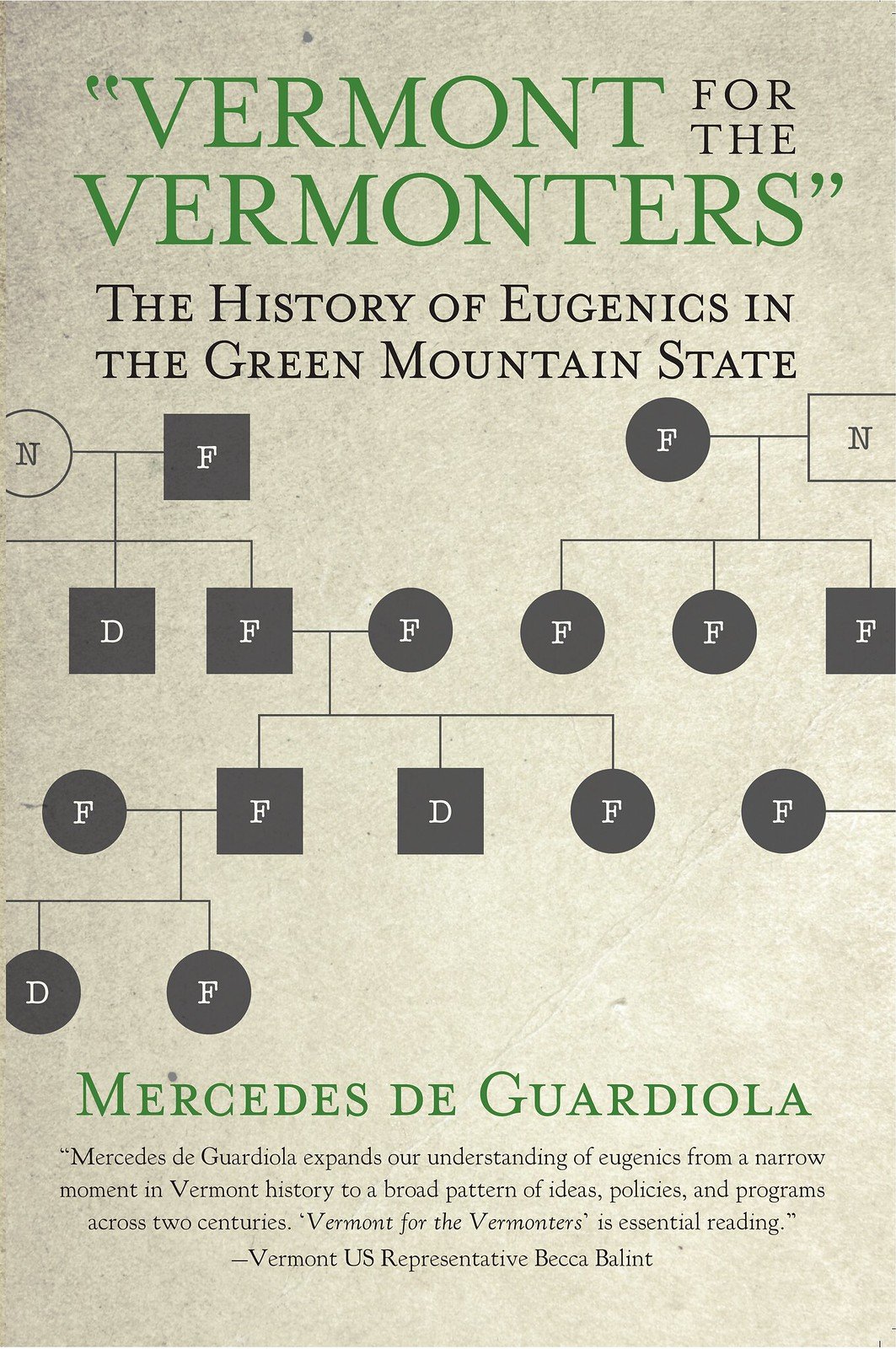New book documents Vermont’s eugenics movement
September 7, 2023 | By Lisa Scagliotti Book cover image courtesy the Vermont Historical Society
The Vermont Historical Society this month will publish a new book about the history of the state’s eugenics movement.
“Vermont for the Vermonters: The History of Eugenics in the Green Mountain State” by Mercedes de Guardiola is scheduled to be released Sept. 28.
Eugenics is a pseudo-scientific field of selective human breeding that rose to prominence in the early 1900s and a foundation philosophy of Nazi Germany. Vermont was one of many American states to adopt eugenics as the basis for public policies such as family separation, institutionalization, and sterilization that targeted vulnerable communities and led to widespread intergenerational harm.
In 2021, the state government formally apologized for the practice, and the Legislature continues to explore steps to follow up that significant acknowledgement.
De Guardiola is a graduate of Dartmouth College, where she began her research into the history of Vermont eugenics as a student there and was awarded the Jones History Prize for her thesis. After publishing her findings on Gov. Mead’s 1912 eugenics campaign in the state historical society’s scholarly journal, Vermont History, she testified about the movement’s history before the Vermont Legislature.
“Vermont for the Vermonters” is the result of years of research and new scholarship into the story of the eugenics movement in the state. Author de Guardiola examines developments from poor farms to mental institutions such as the Vermont State Asylum in Waterbury and public campaigns under Gov. John A. Mead (1910-12) and University of Vermont professor Henry Perkins.
This research demonstrates the underlying social and political landscape that helped pave the way for strong support of Vermont’s eugenics policies and allowed those policies to be carried out with a devastating cost for Vermonters. The book puts past eugenics practices in the larger context of the state and the nation’s public policies, giving readers a basis to understand long-term consequences of the movement.
“It has been a rewarding process to see the seed of de Guardiola's research, published in Vermont History in 2019, develop into a meaningful and timely book. Expanding on the work of previous scholars and tapping into a broad array of sources, ‘Vermont for the Vermonters’ explores an international and national sociological movement that took hold in the Green Mountain State,” said Steve Perkins, state historical society executive director. “Though emotionally challenging, the story is a must-read for anyone looking to understand community, exclusion, and belonging.”
Vermont state Rep. Tom Stevens, D-Waterbury, chairs the House General and Housing Committee that heard much testimony on the eugenics movement and its practices and drafted the resolution that the General Assembly ultimately unanimously adopted.
Stevens has previewed de Guardiola’s book and also provided a review. “‘Vermont for the Vermonters’ is an important historical addition to what we know of the state-sanctioned eugenics policies of the early 20th century,” Stevens writes in a cover blurb included on the book. “Mercedes de Guardiola's research shows the investment made by the State of Vermont toward targeting the most vulnerable Vermonters in the name of genealogical purity and out of a desire to limit the economic requirements of caring for Vermont citizens with special needs or those determined to be defective because of race, creed, or color."
Vermont’s U.S. Rep. Becca Balint, was a state senator and Senate President Pro Tempore when the apology resolution was adopted. She also contributes her assessment on the publication.
“De Guardiola expands our understanding of eugenics from a narrow moment in Vermont history to a broad pattern of ideas, policies, and programs across two centuries. As a former social studies teacher, I know that facing our history is necessary to build an inclusive, diverse, and thriving future for our state. ‘Vermont for the Vermonters’ is essential reading,” Balint writes.
State historians say the work is particularly relevant as impacts of these policies and practices a century ago continue to reverberate in today’s society and public policy, particularly with regard to modern mental health services. Meanwhile, institutions such as UVM and Middlebury College are reckoning with the legacy of some of their faculty and leaders related to this movement.
The book will be released on Sept. 28 as a trade paperback ($22.95) and ebook ($9.99). It is available for preorder from the Vermont Historical Society store and also will be sold online on Amazon.com and in physical bookstores.
The Vermont Historical Society will host an event for its members on the 28th at the Vermont History Center in Barre, with a talk and Q&A session with de Guardiola. Further programming focused on the book will be announced in the coming weeks including a possible event in Waterbury.
“Vermont for the Vermonters” joins a line of books published by the Vermont Historical Society that explore the state’s history, including “Discovering Black Vermont: African American Farmers in Hinesburg, 1790-1890” by Elise A. Guyette, “Repeopling Vermont: The Paradox of Development in the Twentieth Century” by Paul M. Searls and “The Rebel and the Tory: Ethan Allen, Philip Skene, and the Dawn of Vermont” by John J. Duffy, H. Nicholas Muller III, and Gary G. Shattuck, and others.

